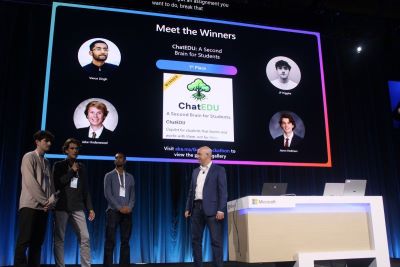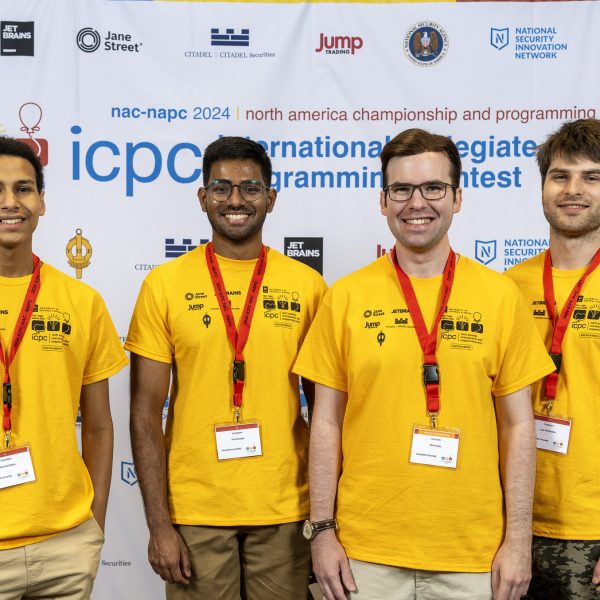Two Vanderbilt computer science teams made impressive showings in recent competitions involving artificial intelligence and programming skills.
The first group—comprised of Vanderbilt undergraduates Jason Hedman, JP Higgins, Vasco Singh, and Jake Underwood—won the Microsoft Generative AI Hackathon April 1 through May 6 for their creation of ChatEDU, a multimodal educational tool that leverages generative AI to create what they call a “second brain for students” by providing personalized, interactive learning experiences.
 With ChatEDU, students upload knowledge files like lectures or assignments as videos, images, PDFs or plain text. The files are then analyzed with Azure AI services to extract relevant topics and connections, which are added to a knowledge graph. Students then prompt task-based AI agents with learning objectives, such as preparing for an exam or completing a problem-set.
With ChatEDU, students upload knowledge files like lectures or assignments as videos, images, PDFs or plain text. The files are then analyzed with Azure AI services to extract relevant topics and connections, which are added to a knowledge graph. Students then prompt task-based AI agents with learning objectives, such as preparing for an exam or completing a problem-set.
Agents identify the relevant components of the knowledge graph and create an Interactive learning pathway. Students ask and answer questions, receive instruction, and progressively work toward their instructional goals. Agents analyze and assess students’ progress, strengths, and areas for improvement, creating a knowledge profile.
“ChatEDU will enhance student competency by tailoring learning experiences to their unique needs, ensuring mastery of concepts, and adapting to their evolving understanding,” said Hedman, a computer science major who graduated in May, along with Higgins and Underwood. “We plan to pilot an enterprise version for higher-ed institutions, offering insights into their students’ diverse learning needs and providing an engaging, digital-native supplement to in-class learning, making education more interactive and personalized.”
Jules White, senior advisor to the Chancellor for Generative AI in Education and Enterprise Solutions, said the students worked on the ChatEDU project in his Software Engineering Projects class.

“These students are innovating at the intersection of Generative AI and education, which is enabled by our culture of ‘radical collaboration’,” said White. “This is one of the great examples of the many exciting things happening on campus as part of our Generative AI efforts.”
The other team, which consisted of Vanderbilt undergraduates Abi Kothapalli, Luka Mushkudiani, and Mohamed Bakry, competed in the North American Championship of the International Collegiate Programming Contest that was held May 23-28. The ICPC is a global algorithmic programming contest for college students around the world to foster creativity, teamwork, innovation, and the ability to perform under pressure. Teams of three challenge each other to invent trustworthy software systems that solve a range of complex, real-world problems.
Vanderbilt’s team beat out hundreds of others to finish in 29th place after the five-hour contest.
“The top 17 teams advanced to the global finals in Kazakhstan, so we just missed the cut,” said David Hyde, co-coach and assistant professor of computer science. “But 29th out of 1,000 is still an admirable finish.”
Contact: Lucas Johnson, lucas.l.johnson@vanderbilt.edu